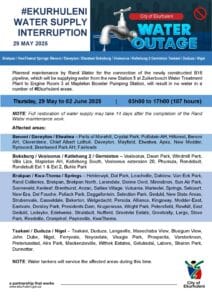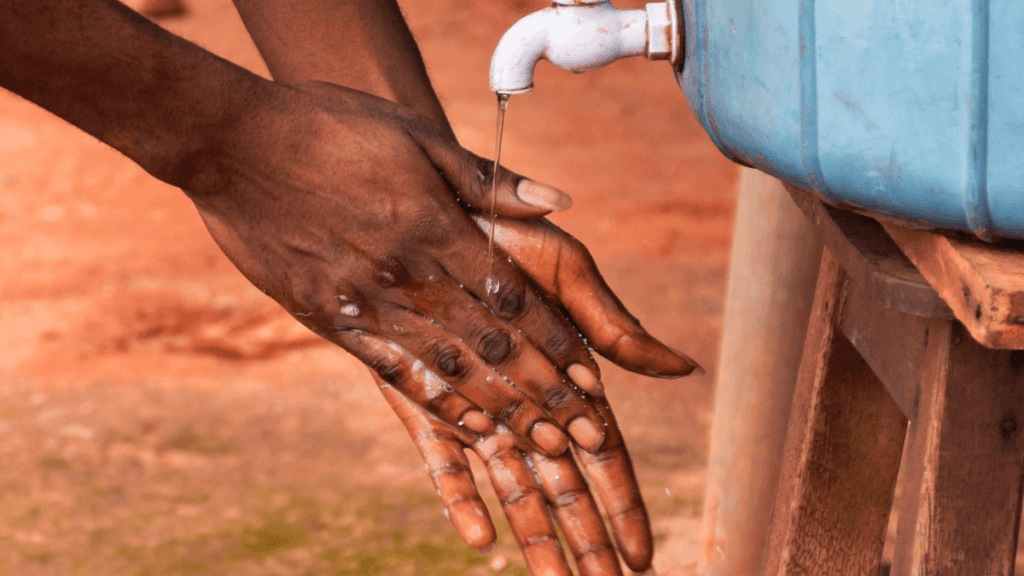Gauteng is about to face a tough few days as Rand Water begins essential maintenance that will cause major water outages across the province. Some residents, especially in the City of Ekurhuleni, could be without running water for up to 107 hours — that’s more than 4 days without supply!
This winter maintenance starts on Thursday, 29 May 2025, and continues until Monday, 2 June 2025, affecting several municipalities. While these upgrades aim to fix and improve Gauteng’s water system for the future, the short-term pain means everyone needs to prepare now.
Why Is Rand Water Doing This Maintenance?
Rand Water supplies water to millions in Gauteng and beyond. To keep water flowing smoothly, they must regularly upgrade pipelines, pumping stations, and treatment plants. This winter’s programme will:
Boost pumping capacity
Improve plant reliability
Enhance overall system efficiency
By doing this work during the cooler months, Rand Water hopes to reduce the impact — but some outages are unavoidable.
Learn More: Rand Water Pours R400 Million into Maintenance While Gauteng Endures Extended Water Outages
Areas Most Affected by Water Outages
Ekurhuleni: Longest Water Cuts
The City of Ekurhuleni will experience the worst outages, with some areas without water for up to 107 hours! The Palmiet System will also be shut down on 3 June for important cleaning and inspections.

Tshwane: Mapleton Booster Pump Station Upgrade
In Tshwane, the connection of a new pipeline will take place from 29 May to 2 June. Officials will pre-fill reservoirs to over 80% to reduce the impact, but expect some supply interruptions.
Other Municipalities
Other affected areas include:
Rand West
Mogale City
Madibeng
Rustenburg
Emfuleni
These municipalities should prepare for outages lasting between 10 to 12 hours.
Key Pumping Stations Impacted
Eikenhof
Palmiet
Mapleton
Zwartkopjes
These stations keep water pressure steady across Gauteng. With reduced capacity, water availability will drop in many areas.
How Can You Prepare?
Store enough water now — fill buckets, containers, and baths.
Use water sparingly during the outages.
Businesses should keep at least 36 hours’ supply on hand.
Water tankers will visit vulnerable areas, so stay alert to local announcements.
Gauteng’s Water Crisis Deepens
Many communities already struggle with unreliable water, and these planned outages will add to the stress. Recently, the Johannesburg High Court even shut down temporarily due to water shortages.
These maintenance works are critical to fixing Gauteng’s water challenges for the long run — but patience and preparation are essential during the short-term disruptions.
Simple Water-Saving Tips: How to Save Water Before and During Outages
Water is precious — especially now when Gauteng faces long outages. Every drop you save helps your family and community get through this challenging time. Here are practical tips anyone can follow, whether at home, work, or school:
1. Turn Off Taps Tightly
Many people think a tap is off when it’s just barely closed. But even a small drip wastes water — sometimes hundreds of litres a month! Always make sure your taps are turned off properly. Check all taps, including those outside for your garden or car wash.
2. Reuse Water Where Possible
Don’t waste water after using it once. For example:
Collect shower water in a bucket while waiting for it to heat up and use it to flush toilets or water plants later.
Reuse washing-up water (from dishes) for cleaning floors or watering gardens.
Catch rainwater in containers or drums to use in your garden or for washing.
3. Fix Leaks Quickly
Leaking taps and pipes waste a surprising amount of water. If you notice any dripping, leaking, or pooling water around taps or pipes, get it fixed as soon as possible. Even small leaks add up to big water losses over time.
4. Avoid Washing Cars or Watering Gardens During Outages
Try not to use large amounts of water during the maintenance period. Skip washing your car or watering your garden until water supply returns to normal. If you must water plants, do it early in the morning or late in the evening to reduce evaporation.
5. Use Water-Efficient Appliances and Practices
If possible, use water-saving devices like low-flow showerheads or taps. When washing clothes or dishes, run full loads to make every litre count. Avoid unnecessary rinsing or running water continuously.
6. Store Water Safely
Before outages start, fill clean containers, buckets, and bottles with water for drinking, cooking, and washing. Keep stored water covered and in a cool place to avoid contamination.
7. Educate Your Family and Neighbours
Make sure everyone in your household understands the importance of saving water. Encourage neighbours to prepare too — together, the community can cope better.
Related: How to Make Sure Your Water is Safe to Drink
Final Thoughts
The next few days will be difficult, but by planning ahead, Gauteng residents can ease the impact of these long outages. Rand Water’s work now means a more reliable water supply for the future.
Stay safe and share this important update with your neighbours!










